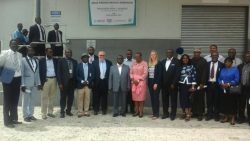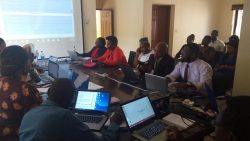Request for Evaluation of Monitoring & Supervision component, NSCIP Terms of Reference

Background
The Nigeria Supply Chain Integration Project (NSCIP) focusses on operationalization of logistics coordination management unit (LMCU) within the state ministry of health which will function as a procurement and supply management (PSM) house and drive supply chain activities and performance improvement at the state level. In year 1 (2015-16), 14 priority states were identified for the project. The scope was expanded to include additional 23 states in year 2 (2017) thus encompassing all 37 states in the countries. The specific objectives of Lot 3 are to achieve the following in 37 states:
- Operationalize the state Logistics Management Coordination Units (LMCUs);
- Deploy a standardized and simplified logistic management information system (LMIS) in the LMCUs;
- Institute a monitoring and supervision (M&S) framework in the LMCUs;
- Strengthen the reporting system and ensure availability of routine inventory reports;
- Develop and deliver an education package on supply chain management.
- Capacity building service (CBS) provider, i+consortium, was awarded with the contract for lot 3.
Monitoring and supervision of the supply chain system is important to improve management and performance thus ensuring availability of medicines and quality of care. It allows managers to make evidence-based decisions for continuous improvement, justify need for additional resources and share results with relevant stakeholders. In the context of this project, once operational, the state LMCUs will be tasked with overseeing and coordinating the entire logistics operations in the respective states, the M&S system will empower the LMCU to monitor the state supply chain (all facilities) and keep track of the progress using selected performance indicators.
The M&S framework is a document that describes how monitoring and supportive supervision of supply chain in the states should be organised and implemented. The purpose of the M&S framework is to ensure that the state LMCUs are adequately equipped to systematically execute regular monitoring and supportive supervision tasks, with a view to drive and sustain evidence-based supply chain improvements in the states.
For the development of the M&S framework, the below illustrated approach was adopted. Based on needs identified during assessments of M&S capacity of state LMCUs and disease programmes, an integrated framework was proposed, piloted and validated in consultation with all relevant stakeholders. The capacity of stakeholders to undertake and fulfil this important responsibility was built via training of trainers and provision of technical assistance to LMCU staff.
Situational analysis
- Rapid assessment
- Consultation with programs
- State planning workshops
- Consolidation of findings
Development & validation of framework
- Development of the framework
- Consultative workshop
- Pilot testing
- Finalisation of the framework
- Validation by PMO
Capacity building & operationalisation
- HR planning
- Training on M&S
- Operationalisation at state level
- (Baseline data collection & target setting)
Evaluation
- Implementation follow-up
This evaluation specifically relates to the monitoring and supervision component.
Purpose and objectives of the evaluation
The overall purpose of the evaluation is to undertake a review of the NSCIP project’s Monitoring and Supervision component in order to generate knowledge, identify gaps in implementation, and document best practices as well as lessons learned that could be used to inform interventions.
The specific objectives of the evaluation are as follows:
- To assess the relevance, efficiency, effectiveness, and sustainability of the specific project component over the two years of implementation;
- To determine the appropriateness of the approaches used to develop and operationalize the framework;
- To determine the extent to which the framework was adopted and implemented by the state LMCUs with sufficient quality and timeliness;
- To identify key barriers and gaps to effective implementation;
- To document any good practices and lessons learned during the project cycle;
- To make recommendations to inform strategies for subsequent phases of NSCIP.
Evaluation scope
The evaluation should be conducted in a total of 4 states representing both the year 1 pilot and year 2 focus states across the different geopolitical zones. The evaluation will be retrospective and cover the period of 2015-17 in which the current NSCIP has been implemented by the CBS provider.
The evaluation will therefore: i) assess the extent to which the planned inputs have contributed to the achievement of the anticipated results, ii) identify the reasons why achievements have or have not been made, and iii) examine any unintended positive or negative results of the program.
Timeline
The consultancy is expected to start in early October and work must be completed over a period not exceeding 20 days including field work and reporting. The final report must be submitted no later than 12 November 2017. Prior to that, the consultant will submit a first draft of the report for review.
Deliverable
The final evaluation report needs to be a document that fully addresses the terms of reference and provides findings and conclusions/recommendations based on robust and transparent evidence. Additionally, the methodology employed for the evaluation must be clearly outlined in the report.
Electronic versions (word and pdf) of the report must be submitted.
Qualifications and experience required
Interested national consultants (institutional or individual) should have proven experience in conducting project evaluations; good knowledge about Nigeria and ongoing projects on strengthening health supply chain management; good understanding about monitoring and supervision for measuring supply chain performance; ability to express clearly and concisely ideas and concepts in written form; and excellent communication skills.
Proposal submission
Interested bidders are invited to submit proposals as follows:
Technical and financial proposal in response to the ToR including proposed approach, methodology, sampling strategy for the states, draft workplan and timelines.
It shall include CVs of consultant(s), track record of at least 3 similar assignments conducted in the past (including references) and daily consultancy fees (in US dollars).
Electronic copies of the proposal (pdf) shall be submitted via email to iplusconsortium@gmail.com no later than 18 September 2017 17:00 CET.
Evaluation criteria
- Budget proposal – 20 points
- Technical proposal – 80 points
- Approach and methodology – 30
- CV(s) and past experience – 40
- Organization and timeline – 10



